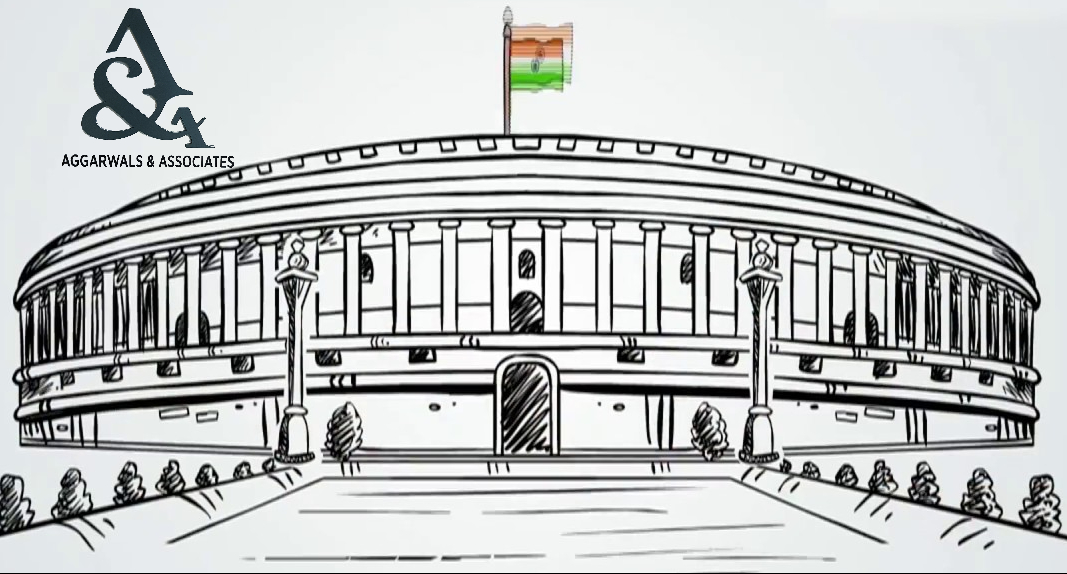
by Aggarwals Associates | Oct 29, 2020 | General
According to old Hindu laws, marriage is formal ceremony and religious tie that can’t be broken. In modern laws, if a person does not want to stay in married life and does not want to extend any longer then he/she can request relief under the Hindu Marriage Act by way of judicial separation. Judicial separation is a medium under the law to give some time for self analysis to both the parties of a disturbed married life.
What is judicial separation?
Judicial separation is a legal remedy to temporary suspends the marriage of husband and wife having strained relations. Law allows them free space and independence to think their future path. Judicial separation allows disgruntled couples to live separately for a specific time and is usually used as a final resort before filing for divorce. Section 10 of the Hindu Marriage Act deals with the provision of judicial separation.
What is Section 10 of the Act?
Section 10 of the Hindu Marriage Act says that either husband or wife can file petition for judicial separation on any grounds of divorce. Once the order of judicial separation has been passed, then it is not obligatory for spouse to cohabit the marriage. However court can cancel the decree of judicial separation on application made by any party to the petition on satisfaction of truth of the statements.
What are the grounds?
The following grounds are available for judicial separation under Hindu Marriage Act, 1955:-
• Cruelty: Cruelty can be either physical or mental harassment. If spouse is inflicted with physical, mental, emotional and financial pain etc. then he/she can file petition for judicial separation under this ground.
• Desertion: Desertion is a complete refusal of matrimonial alliance and obligations. If the spouse left the other spouse for any reason without informing him or her then the other spouse can file petition for judicial separation. Desertion period must be of 2 years.
• Adultery: If spouse has been in an adulterous relationship then other spouse can get legal separation on this ground.
• Conversion: If any spouse gets converted into any other religion other than Hindu, then the opposite spouse can file for judicial separation.
• Unsoundness of mind: If any spouse in a marriage is suffering from any mental disease which is difficult to live for other spouse with that spouse. The other spouse can get relief by filling petition for judicial separation.
• Venereal disease: If spouse is suffering from any venereal disease which is communicable in nature then in that situation other spouse can seek relief on this ground. It is important to mention here that now leprosy is not a ground for divorce and judicial separation as per latest personal laws amendment in 2018.
• Renunciation of the world: When a person has given up the world and leading a holy life then he/she is considered as civil dead. If a spouse renounces the world to live a holy life then his/her partner can file legal separation.
• Civil Death: When the whereabouts of any person is not known for atleast 7 years then he/she is presumed to be dead in the eyes of law. It is also called civil death. This is also a ground for legal separation.
• Additional grounds only available to wife: There are some additional grounds which are only available to wife to seek legal separation. These are if husband is guilty of rape, sodomy, bestiality and bigamy then wife can opt for legal separation. If decree or order has been passed by the court for maintenance to wife and they have not been living together for more than 1 year then wife can resort to the legal separation. Wife can also file legal separation if she was married before 15 years of age and refuse to accept the marriage after attaining that age. However, such refusal must be made before the age of 18 years.
Where to file the petition?
Spouse can file petition for judicial separation at one of the following places:-
• Where the marriage was solemnized.
• Where the both husband and wife last resided together.
• Where the petitioner is living currently.
• Where is respondent is living or carries on its business.
How judicial separation is different from divorce?
Even the grounds for judicial separation and divorce are same, but these two matrimonial remedies are different. In judicial separation both spouse are allowed to live separately but marriage still exists, on the other hand in divorce marriage is dissolved and both spouse are no longer husband and wife. The other major difference is that judicial separation can be filed at any time after marriage. But the divorce petition can be filed only after the expiry of one or more years of marriage.
Conclusion:
A marriage is considered as a sacred relation in our nation but a person should have an exit from a relationship when he/she is not happy with that relation. Seeking divorce is a very tough decision in the life of married couple. In order to evade such tough situation and to provide some space to rethink about the relationship, the Hindu Law provides the remedy of legal separation. People who are Hindus as per the Hindu Marriage Act, 1955 can seek relief from strained relations in their marriage by filling legal separation.
-Kiranpreet Kaur
Associate at Aggarwals & Associates, S.A.S. Nagar, Mohali

by Aggarwals Associates | Oct 16, 2020 | General
The first consumer protection legislation i.e. Consumer Protection Act, 1986 is repealed with the new Consumer Protection Act, 2019 with effect from 20th July, 2020. The first legislation was introduced to guard consumer rights. However, with the advent of technology and introduction of e-commerce and various other mechanisms of conducting business, the necessity to bring changes in the previous legislation is felt to better protect modern-day consumers.
The new Act tends to provide protection to buyers not only from traditional sellers but also from new e-commerce retailers and platforms. This latest piece of legislation brings easement for buyers by recognizing online transactions as well as provides facility to institute complaints from place of residence or work.
What is the aim of Consumer Protection Act, 2019?
The essence of Consumer Protection Act, 2019 is to save rights of the customers by establishing authorities for timely and effective administration and effective redressal of customer’s complaints. It is established to protect the interests of customers.
Gist of Consumer Protection Act, 2019:
Broad definition of consumer: As per the new Act, a person is called a customer who avails the services and buys any good for self use. It is notable to mention here that if person buys any goods and any avail services for resale or commercial purpose, is not considered a customer. The definition covers all types of transactions i.e. offline or online.
Convenience to consumers: The new Act allows the consumer to file complaint before the authority under whose jurisdiction he/she resides or work. This new concept is opposed to the earlier trend of filing complaint at the place of seller. Complaint can also be filed via electronic mode and even proceedings of the same can take place via video conferencing on showing reasonable ground by the consumer. Period of limitation to file appeal before the State Commission against the order of District Commission has been increased from 30 days to 45 days. Second appeal is also maintainable before the National Commission under Section 51 (3) if it involves any substantial question of law.
Establishment of the Central Consumer Protection Authority: The authority also refers to CCPA which will be headed by Director-General to protect, promote and enforce the rights of customers. The CCPA will regulate the cases related to unfair trade practices, misleading advertisings and violation of consumer rights.
Investigation wing will be established in the authority to investigate and enquire violations under the Act. The CCPA will have right to impose penalty on violators and pass orders to recall goods or withdraw services, stop unfair trade practices and reimbursement of the price paid by the customers. National Commission is empowered to hear appeals against the orders of Central Consumer Protection Authority.
Establishment of Consumer Disputes Redressal Commission: The new Act renamed the District Consumer Disputes Redressal Forum as District Consumer Disputes Redressal Commission and also provides the establishments of Consumer Disputes Redressal Commissions at national and state levels. The Consumer Disputes Redressal Commissions will entertain the complaints with regard to following subject matters:-
- Sale of defective goods or services
- Overcharging or deceptive charging of goods or services.
- Sale of hazardous goods or services which may be dangerous to life.
- Unfair trade practices.
Penalty for misleading advertisement: The manufacturer can be punished with fine or imprisonment upto 2 years for misleading advertisement. On the repetition of the same may attract the fine of Rs. 50 lacs and imprisonment upto 5 years. Such power to impose penalty for false or misleading advertisement will vests with CCPA.
Jurisdiction: Before discussing more, it is important to know what does jurisdiction means. Jurisdiction is a power of court to try or hear cases under any specific area that area can be geographical or on the basis of specific subject matter or monetary limit. The Consumer Protection Act decides the jurisdiction of the court on the basis of monetary limit.
The new Act revised the monetary jurisdictions of consumer commissions. Now, National Consumer Disputes Redressal Commission will have jurisdiction to entertain the complaints worth more than Rs. 10 crores, State Commission will have jurisdiction to hear complaints when value is more than 1 crore but less than 10 crore. District Commission will hear complaints when value of goods or services is upto Rs 1 crore.
Recognition of mediation: The new Act provides statutory recognition to mediation under Section 74. To get quick justice in consumer disputes the mechanism for promoting mediation in redressal of consumer disputes is provided.
Product liability: The new Act brings the concept of product liability according to the same; customer can demand compensation from the manufacturer, seller or service provider for the harm incurred by a defective product or deficiency in service.
Rights of consumers: The consumers will have following rights under the new Act:
- To know about the quality, quantity, potency, purity, price and standard of goods and services.
- Protection from hazardous goods and services.
- To be shielded from unfair trade practices.
- To have access to variety of goods or services at competitive prices.
Conclusion:
With the introduction of various e-commerce platforms in business the need for new legislation for cover of consumers is felt, so to cater this need our Parliament brings amendment in the existing Consumer Protection Act to keep pace with the time. It was required to bring amendments under Consumer Protection Act as with advent of technology numerous questions arise for protection of consumers. The New Act broadens the definition of consumer and recognizes both offline and online transactions for purchase of products and services which can be proved as boon for consumers in future.
Kiranpreet Kaur
Associate at Aggarwals & Associates, S.A.S. Nagar, Mohali

by Aggarwals Associates | Oct 8, 2020 | General
This write up put some light on the diverse laws passed by the Parliament’s Monsoon Session this year. The Parliament on 23nd September, 2020 passed three major labour law codes i.e. The Code on Social Security, 2020, The Industrial Relations Code, 2020 and The Occupational Safety, Health and Working Conditions Code, 2020 by merging 24 existing labour laws into codes so as to bring labour reforms in the country.
With the enactment of these Codes various labour laws such as The Factories Act, The Contract Labour Act, The Mines Act, The Employee’s Compensation Act, The Employees’ State Insurance Act, The Payment of Gratuity Act, The Employees’ Provident Funds and Miscellaneous Provisions Act, The Trade Unions Act, The Industrial Disputes Act and many more are repealed.
Let’s emphasis on the newest provisions concerning labour laws enshrined under the newest pieces of legislation:-
The Code on Social Security, 2020
Social security fund for both organized and informal workers: Under this new enactment the Govt. will set up a social security fund for both organized and informal workers as well as gig workers and platform workers. Informal workers means home based workers and self employed workers. The term gig worker refers to workers outside the traditional employer-employee relationship, and platform worker are those who access organizations or individuals through online platform to provide services or to unravel specific problems.
The Code also provides the provisions for registration of all three categories of workers i.e. informal workers, gig workers and platform workers.
National security scheme for gig worker and platform workers: The Govt. may establish a National Security Board for the purpose of welfare of gig workers and platform workers and this board can recommend and monitor schemes for gig worker and platform workers. This board will include the Director General of ESIC, 5 representatives each from aggregators, state governments, gig workers and platform workers.
Changes in definitions: The Code brings the changes in definitions like expanding the definition of ‘employees’ by including contractual workers, expanding the definition of ‘inter-state migrant workers’ by including self employed workers from other states, expanding definition of ‘platform workers’ to additional categories of services or activities as may be notified by the Govt. and exempting construction work from the ambit of ‘building or other construction work’ if the entire cost of construction work exceeds 50 lakhs.
Term of eligibility for gratuity: Earlier, it was settled law that gratuity was payable on the termination of employment, if employee serves in the establishment for at least 5 years. The new Code reduces the gratuity period from 5 years to 3 years in the case of working journalists.
The Occupational Safety, Health and Working Conditions Code, 2020
Threshold limit for coverage of establishments: The Code provides the new threshold limit for various establishments for coverage. For factories increases the edge limit to 20 workers for premises where the manufacturing process is carried out using power and 40 workers for premises where it is carried out without using power. For establishments where any hazardous activity is carried out removes the edge limit as number of worker doesn’t matter for coverage.
In case of case of contract worker the Code increases the limit as the establishments or contractors employing 50 or more workers covered under this Code. The new Code also removes the threshold limit in building and other construction work.
Daily work hour: The new Code fixes the maximum eight hours per day as daily work hour limit.
Employment of women in hazardous work: The new Code provides that women will be entitled to employed in all establishments for all types of work. If they are required to do hazardous work then the employer is required to provide adequate safeguards prior to their employment.
Definition of inter-state migrant worker: The new Code defines inter-state migrant worker as a person who moves on his own to another state and obtains employment there and earning a maximum Rs. 18,000/- per month or such higher amount Centre Govt. may notify.
Advantages for inter-state migrant workers: The Code provides certain advantages for inter-state migrant workers. This includes: benefit of public distribution system either in native state or the state of employment, benefits under the building and other construction cess fund in the state of employment and insurance and provident fund available to other workers in same establishment.
The Industrial Relations Code, 2020
Applicability of standing orders: As per the Code, establishments with 300 workers must have to prepare standing orders on the matters listed in the Schedule of the Code. These matters includes the classification of workers, manner of informing workers about work hours, holidays, paydays and wage days, termination of employment and grievance redressal mechanism for workers.
Prior permission in case of closure, lay-off and retrenchment: Under the new Code, Govt. can only increase the threshold limit for permission requirements via notification. Earlier, it was mandatory to obtain prior permission of the Govt. for establishment employing 100 workers in case of closure, lay-off and retrenchment. Now, establishments having strength of atleast 300 workers are required to take prior permission of the Govt. for closure, lay-off and retrenchment.
Disputes relating to termination of individual worker: The Code classifies any dispute in reference to discharge, dismissal, retrenchment, or otherwise termination of the services of an individual worker to be an industrial dispute. The worker may apply to the Industrial Tribunal for adjudication of the same after 45 days of the application for conciliation of dispute was made.
-Kiranpreet Kaur
Associate at Aggarwals & Associates, S.A.S. Nagar, Mohali

by Aggarwals Associates | Oct 8, 2020 | General
This article focused on to unearth varied features of newly enacted legislations by the Parliament of India in its monsoon session. The Rajya Sabha on 20th September, 2020 passed two new farmers bills i.e. The Farmers’ Produce Trade and Commerce (Promotion and Facilitation) Bill, 2020 and The Farmers (Empowerment and Protection) Agreement on Price Assurance and Farm Services Bill, 2020. Both bills were introduced within the Lok Sabha on 14th September, 2020. On 22nd of September, 2020 Parliament passed The Essential Commodities (Amendment) Bill, 2020 so as to bring amendments in The Essential Commodities Act, 1955.
Brief of the diverse provisions of those newly enacted bills is discussed below:-
The Farmers’ Produce Trade and Commerce (Promotion and Facilitation) Bill, 2020:-
This newly enacted piece of legislation will allows the farmers to sell their produce within inter-state beyond the physical premises of APMC markets. State Govt. will be prohibited from imposing any market fee or levy outside the APMC areas. APMC stands for Agriculture Produce Marketing Committee which mainly regulated the agricultural markets in India.
Inter-state trade of farmers’ produce: The basic feature of the bill is that it allows inter-state trade of farmers’ produce outside the premises of markets established by market committees formed and notified under the state APMC Acts. Now a farmer can sell his produce in an outside trade area. Such outside area can be a farm gates, factory premises, warehouses and cold storages.
Electronic trading: An electronic trading and transaction platform may be set up to facilitate the direct and online buying and selling of such produce through electronic devices and internet. Companies, partnership firms or registered societies may establish and operate such platforms under this new bill.
Abolition of market fees: The new prohibits the State governments from imposing any market fee, cess or levy on farmers, traders and electronic trading platforms for trade of farmers’ produce conducted in an outside trade area.
The Farmers (Empowerment and Protection) Agreement on Price Assurance and Farm Services, Bill, 2020:
Farming agreement: The bill provides for agreement between the farmer and buyer for any farm produce. The minimum period of such agreement will be one crop season or one production cycle of livestock. The agreement can be made for maximum period of 5 years, unless the production cycle is more than 5 years.
Pricing of farming produce: The price for farming produce and the process of price determination should be mentioned in the farming agreement. Prices subjected to variation, guaranteed price for the produce and a clear reference for any additional amount above the guaranteed price must be laid out in the agreement.
Settlement of dispute: For settlement of disputes under the bill, farming agreement must provide for a conciliation board as well as conciliation process. At first, all the disputes must be referred to the board for resolution. If the board fails to settle the dispute within 30 days then the parties may approach Sub-divisional Magistrate for resolution. Parties will have a right to appeal before an Appellate Authority against the decision of Sub-divisional Magistrate. Both the Magistrate and Appellate Authority will be bound to dispose of the matter within 30 days from the receipt of application. Both authorities will have liberty to impose certain penalties on the party contravening the agreement. Howbeit, no action can be taken against the agricultural land of farmer for recovery of any dues.
The Essential Commodities (Amendment) Bill, 2020:
Regulation of food items: The new bill empowers the Central Govt. to regularize certain commodities like food items, fertilizers and petroleum products as essential commodities. The Central Govt. may regulate or prohibit the production, supply, distribution, trade and commerce of these commodities. The bill detaches the cereal, pulses, oilseed, edible oil, onion and potatoes from the list of essential commodities. However, the Central Govt. may regulate the supply these food items in extraordinary circumstances such as war, extraordinary price rise, famine and natural calamity of grave nature.
Stock limit: According to the new amendment, stock limit on agricultural produce must be imposed consistent with price rise. A stock limit may be imposed if there is 100% increase in retail price of horticulture and 50 % increase in the retail price in case of non-perishable agriculture food items. Such increase will be calculated over the price prevailing immediately last 12 months, or the average retail price of the last 5 years, whichever is a smaller amount.
-Kiranpreet Kaur
Associate at Aggarwals & Associates, S.A.S. Nagar, Mohali

by Aggarwals Associates | Oct 7, 2020 | General
The concept of enforcement of foreign judgments in India is contemplated under the Civil Procedure Code (CPC). A foreign judgment is judgment of foreign court and foreign court means a court situated outside India. Thus the judgments delivered by courts in England, France and USA etc. are foreign judgments. The fundamental principle for enforcement of foreign judgment or decree in India is to make sure that the judgement or decree is a conclusive one, passed on the merits of the case by a superior court having competent jurisdiction. The recognition and enforcement of foreign judgment and decrees in India is governed by Section 44-A read with Section 13 of the CPC.
Definition of foreign court and foreign judgment under CPC:
The Civil Procedure Code defines the foreign court and foreign judgment as follows:
Foreign Court {Sec 2(5)}: Means a Court situated outside India and not established or continued by the authority of Central Government.
Foreign Judgment {Sec 2 (6)}: Means the judgment of foreign court.
What are the requirements of foreign judgments for enforcement in India?
A foreign judgment required to be conclusive for it to be enforceable in India. The test of conclusiveness is provided under Section 13 of CPC, which is enumerated below:-
- It must be pronounced by court of competent jurisdiction.
- It must be given on the merits of the case.
- It must not to be founded on incorrect view of international law or must not refuse to recognize law of India in cases in which such law is applicable.
- The proceedings on the basis of which judgment is delivered must not opposed to the principle of natural justice.
- It must not be obtained by fraud.
How foreign judgment can be enforced in India?
Under the Indian Law there are two ways to enforce foreign judgments. Firstly by filing an execution petition under Section 44-A of the CPC where the judgment has been passed by court of reciprocating territory. Secondly by filing suit upon the foreign judgment/decree.
Decrees passed by courts in reciprocating territories: Reciprocating territories enjoy the privilege of direct enforcement of a decree within the territory of India by filling execution of the decree before Indian court. As per the provisions of CPC, if a certified copy of the decree of any of the superior court of any reciprocating territory is filed in a district court, then decree may be executed in India as if it has been passed by the district court.
Judgments passed by non-reciprocating territories: In the case of judgments pertains to a country which is not a reciprocating territory then fresh suit will have to be filed in India on the basis of such judgment or decree. Such judgment or decree will be treated as a piece of evidence in fresh suit. Execution of such foreign decree can be filed only after obtaining Indian decree. The time limit to file fresh law suit in India is within 3 years from the date of foreign judgment.
However in both cases, decree has to pass the test of Section 13 of CPC which specifies certain exception under which foreign judgment becomes inconclusive, and therefore not executable or enforceable in India.
What are reciprocating territories?
Reciprocating territories means any country or territory outside India which has been declared a reciprocating territory by Central Govt. by notification in Official Gazette for the purpose of foreign judgments. The following countries come under the list of reciprocating territories as per the provisions of Section 44-A of the CPC:-
- United Kingdom (UK)
- Singapore
- Bangladesh
- United Arab Emirates (UAE)
- Malaysia
- New Zealand
- Hong Kong
- Trinidad &Tobago
- The Cook Island including Niue and The Trust Territories of Western Samoa
- Papua and New Guinea
- Fiji
- Aden
What is the limitation period for enforcement of foreign judgments?
The CPC provides that foreign judgments and decrees from reciprocating territories are treated as decrees passed by Indian courts for the purpose of execution. In the same way, Limitation Act, 1963 would apply in the case of limitation period for enforcement of foreign judgments. Which is as under:-
- Limitation period for execution of a decree granting mandatory injunction would be 3 years from the date of decree.
- For execution of any other decree, limitation period would be 12 years from the date of decree or where the decree directs any payment of money or delivery of any property to be made at certain date.
A judgment obtained from a non-reciprocating territory can be enforced by filing a new suit in an Indian court for which a limitation period of three years has been specified under the Limitation Act, 1963 commencing from the date of the said foreign judgment.
Which is a competent court for enforcement of foreign judgments?
As per the provisions of CPC, a judgment from a reciprocating territory seeking enforcement in India must be filed before the district court having jurisdiction to entertain the matter. If the judgment or decree has been passed by a court of a non reciprocating territory, then a suit must be filed before the competent Indian Court.
Is right to appeal lies?
Foreign judgments pronounced by superior court in reciprocating territories are enforceable in India in same manner as judgment from domestic district court. Therefore, right to appeal against such judgments exists in the same manner as the right to appeal from the judgment of an Indian court. In case of judgments of non-reciprocating territories, the issue of enforcement and appeal arise in respect of such judgment when the same have been affirmed by domestic civil court.
Conclusion:
The process for enforcement of foreign judgement is complicated one because of risk under Section 13 of the CPC. It can be seen that, the plaintiff has to come to the Indian Courts to either get the foreign judgment executed under Section 44-A of the CPC or file a suit upon the judgment for its enforcement. Therefore, it is advisable for a foreign plaintiff to institute suit in India itself in case the defendant in India to avoid the risk under Section 13.
-Kiranpreet Kaur
Associate at Aggarwals & Associates, S.A.S. Nagar, Mohali







Recent Comments